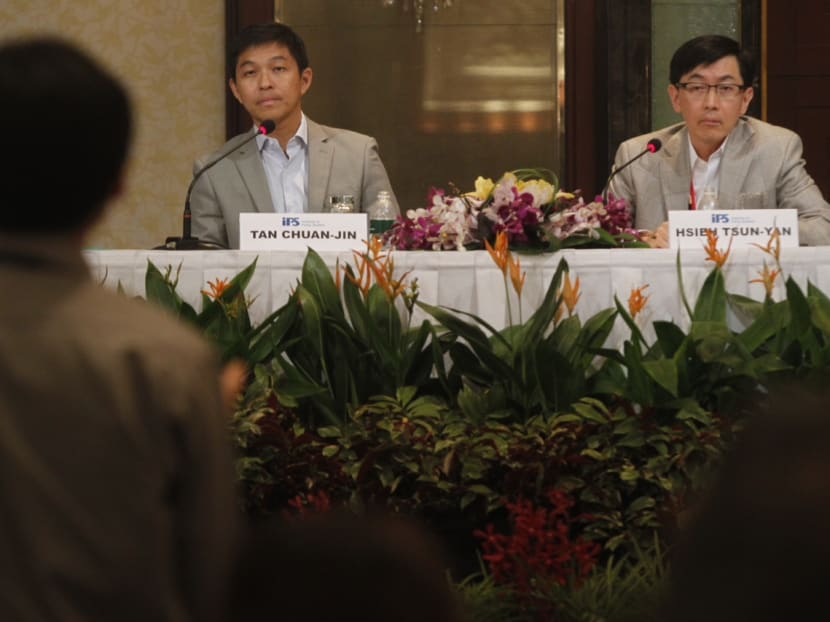Is ‘generous’ use of CPF funds a threat to retirement adequacy?
SINGAPORE — Has the Central Provident Fund (CPF) scheme been too liberal in its use for housing and medical purposes, which, in turn, threatens retirement adequacy? Should there be a social pension scheme to ensure financial security for those with little CPF monies, such as stay-home women and the unemployed?

Minister for Manpower Tan Chuan-Jin (left) and forum moderator Hsieh Tsun-Yan (right) listen to a question from the floor at the Insitutue of Policy Studies' forum on CPF and Retirement Adequacy. Photo: Don Wong
SINGAPORE — Has the Central Provident Fund (CPF) scheme been too liberal in its use for housing and medical purposes, which, in turn, threatens retirement adequacy? Should there be a social pension scheme to ensure financial security for those with little CPF monies, such as stay-home women and the unemployed?
These were among the issues raised at the Institute of Policy Studies’ CPF and Retirement Adequacy forum yesterday, whose 260 participants included academics and members of the public.
Associate Professor Lum Sau Kim from the National University of Singapore (NUS) noted that the ability to withdraw CPF funds for housing has “constrained retirement adequacy”.
She added that many people invested in housing due to expected good returns. “If so much of CPF funds are dedicated to housing, then we have poorly diversified household portfolios ... so the nest-egg that we have will be vulnerable to housing sector shocks and greater risks,” she said.
Other participants also cautioned excessive Medisave withdrawals from CPF.
Singapore Management University academic Augustine Tan asked if such withdrawals have been “too generous”, while medical doctor Paul Tambyah felt that this might result in burdening future generations.
NUS business professor Joseph Cherian, one of the forum’s panelists, also felt that there is need to keep CPF funds for retirement and other uses separate, to reduce the temptation of tapping on one’s retirement savings.
And with the CPF scheme meant for working individuals, some participants also raised concerns about women who might drop out of the workforce early or vulnerable groups like the disabled.
Dr Vivienne Wee, from the Association of Women for Action and Research (AWARE), noted that there are still families today where the man is the sole breadwinner, and this has resulted in the woman not being able to accumulate CPF monies.
She said: “The CPF is pegged to the individual employee, individual CPF holder — what about the woman?”
Some participants proposed a social pension scheme tied to economic growth so vulnerable groups could be provided with a basic social safety net.
Offering a different perspective, panelist Wong Su-Yen, chairman of Marsh & McLennan Companies in Singapore, noted that Singaporeans should not equate retirement with CPF, since people do rely on other sources, such as their families. There is a need, she added, to move beyond CPF to look at other sources — such as investments and savings — depending on a person’s own level of adequacy. “It doesn’t mean to say that retirement is solely provided by CPF,” said Ms Wong.
Fellow panelist Alfred Chia, chief executive at SingCapital, also noted that it will be insufficient to rely on CPF for retirement as it is meant to act as a social safety net. He called on the Government to give Singaporeans more autonomy to exercise their own investment choices.
Manpower Minister Tan Chuan-Jin, who spoke at the forum, reiterated that the Government is looking to strengthen the CPF system to ensure its sustainability. Among other things, he cited existing policies, such as MediFund, which helps needy seniors pay for their medical bills to avoid overtaxing the younger generation’s Medisave savings.
But Mr Tan stressed that CPF is by and large a sound system. “It is very much a judgment call as to how much we want to accumulate, how much flexibility we want to afford because all this has an impact,” he said.
“It (CPF) plays an important part in housing, which we believe continues to be an important part of providing that level of assurance for Singaporeans, not just in retirement but for their daily living needs”. ADDITIONAL REPORTING BY JOY FANG






